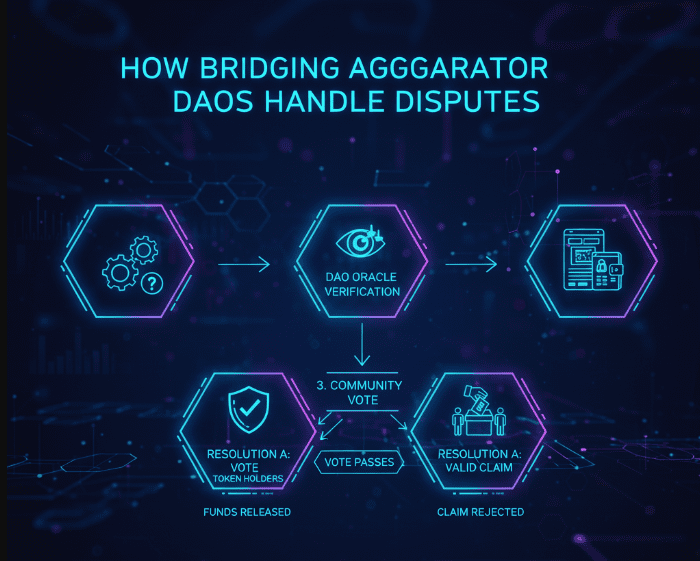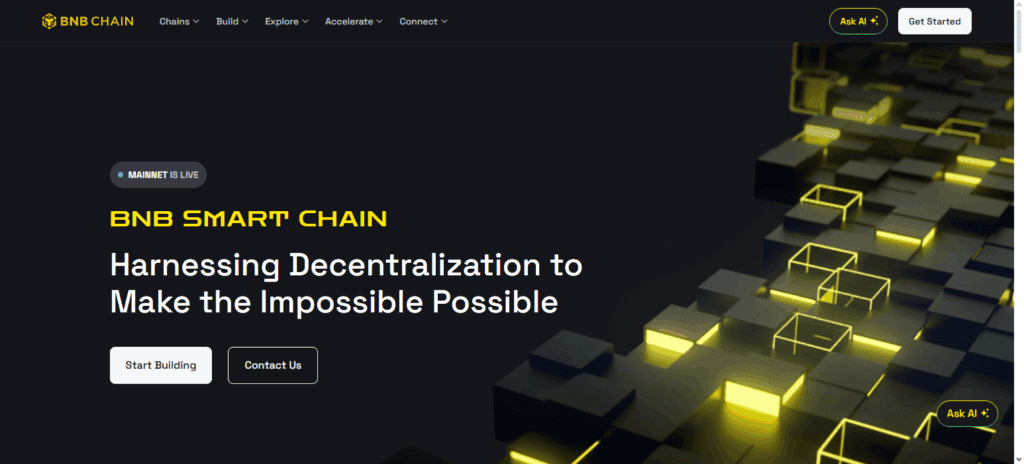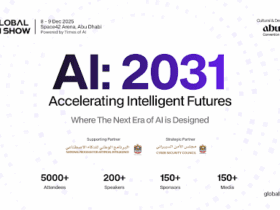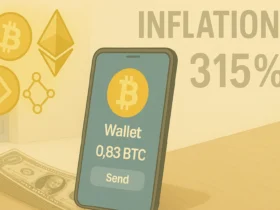In this article, I will analyze how Bridging Aggregator DAOs manage disputes. These DAOs are decentralized platforms that integrate a multitude of blockchains and permit the effortless transferring of assets cross chains.
Disputes may arise from the failure of transactions, disagreements in governance, or the functioning of a smart contract. Such disputes are resolved through effective mechanisms like on-chain voting, an arbitration panel, or an automated smart contract. All of which provide trust and transparency that help a DAO operate efficiently.
What is Bridging Aggregator?
A Bridging Aggregator is like a ‘one stop shop’ for all your token and asset transactions across various blockchains and for all your seamless data movement needs across blockchains.
Bridging Aggregators do not use only one bridging method which increases delays and gas fees. Instead, they routes each transaction with convoluted pathing around the fractalized liquidty pools which saves fees and slippage with bridged transactions.

Combining many different token bridging protocols improves movement asset mobility and movement security, further increasing user confidence.
Aggregators play a key role in the multi-chain architecture holder for DeFi, NFTs and other dApps across all chains, while reducing the risk and performance issues of standalone bridges.
How Bridging Aggregator DAOs Handle Disputes

Example: Dispute Over a Failed Cross-Chain Transaction
Step 1: Issue Reporting
A user claims that during their bid on an Ethereum-based NFT, one of their tokens was incorrectly transferred to the Binance Smart Chain, despite the user having paid a fee for the bridging functions.

Step 2: Evidence Submission
Users are able to submit evidence by means of transaction hashes, supporting screenshots, and any associated logs needed to the DBSA dispute portal.
Step 3: Verification
The moderators of the DAO or programmed Smart Contracts validate whether any bridging functions were overloaded of user error.
Step 4: Community Review
The DAO votes on the dispute by delegating it to a token-based arbitration panel. The token holders analyze the supporting documentation and brainstorm on the possible remedies.
Step 5: Resolution Decision
The DAO has to decide on whether an airdrop in the form of a refund will take place, the transaction will be re-attempted, or corrective measures will take place, depending on the voting outcome.
Step 6: Enforcement
The necessary tokens are either reimbursed back or sent down the correct routing path. Smart Contracts will implement the decision made to re-adjust the payment, if any.
Step 7: Documentation and Feedback
The case outcome is privately stored on the Blockchain and case logs are saved for future reference and use. Feedback will also be taken into consideration to improve the case in the future.
Common Types of Disputes in Bridging Aggregator DAOs
Transaction Problems: Losing or stranded assets due to cross-chain transfer process errors or delays.
Governance Issues: Conflict among DAO participants over a proposal, the outcome of voting, or a protocol change.
Liquidity Disputes: Disputes concerning the distribution of funds over several bridges, affecting efficiency and surcharge.
Smart Contract Weaknesses: Disputes arising from bridges contracts bugs and exploits with disputes around the liablity and compensation.
Miscalibrated Incentives: Participants, validators, and liquidity providers wars over rewards and penalties.
Fraud or Evil: Intentional abuse of the bridging control or the governance system.
Mechanisms for Handling Disputes
On-Chain Governance Voting
Each member of the DAO votes on proposal to resolve the dispute, thus empowering them with the ability to make decisions in a secure, simple, and transparent manner.
Community-Elected Arbitration Panels
Panels are composed of community members who have a reputation and are able to make decisions regarding disputes.
Decentralized Dispute Resolution
Dispute Resolution platforms such as Kleros and Aragon Court provide disputes to be settled in a fair, automated manner, and without the need of a third party.
Smart Contract Enforcement
Smart contracts are able to carry out contractual terms of a determined agreement without human involvement, thus maintaining integrity and impartiality.
Mediation and Negotiation Tools
Tools for mediation help parties to reach an agreement without the need to escalate the issue to an external party.
Transparent Reporting and Logging
All settled disputes are logged on on the chain in order to maintain accountability and trust.
Advantages of Effective Dispute Handling in Bridging Aggregator DAOs
Increased Community Trust: Users and participants gain confidence through fair and transparent resolution of disputes.
Reduced Financial and Operational Risks: Conflict losses, failed transactions, pending transactions, and liquidity are all issues that can be prevented through timely resolution of disputes.
Enhanced Transparency and Accountability: All actions are available, visible, and able to be marked through transparent on-chain records of the disputes and their resolutions.
Improved Cross-Chain Operational Agility: Dispute resolution agility minimizes the disruptions of cross-chain asset transfers while maximizing operational reliability.
Higher Engagement in Governance: Defined parameters of participation constantly motivate users to vote and make decisions.
Increased Trust and Attraction to the DAO: A reliable dispute resolution process improves reputation, attracting users, investors, and liquidity providers.
Challenges and Limitations
Managing Complexity of Multi-Chain Operations
Dispute management over different blockchains can become very difficult.
Protracted Decision-Making
Devolved voting and the consensus process can all lead to a very sluggish outcome.
Voter or Participant Apathy
A disengaged community can in perpetuity lower the equity and representative quality of the outcomes.
Biased Arbitration
Elected panels or voters are more likely to be compromised and biased.
Contract Confinement
The automated resolution may fail if the dispute is unusual.
Substantial On-Chain Dispute Costs
Resolving disputes on chain may lead to exorbitant fees and lowered productivity.
Future Improvements in DAO Dispute Management
In the future, improvements in DAO dispute management are aimed at increasing speed, equity, and automation. Advanced automation on smart contracts can resolve common disputes in real-time which minimizes time delays and eliminates the chance of human error.
AI-guided detection and analysis tools can detect conflict issues at their origin and stop them before they develop further. Better incentive structures for voters and arbitrators can enhance the active, unbiased participation in issue resolution.
Moreover, improvements in cross-chain interoperability will ease dispute management on several blockchains.
All these tools together are meant to raise the level of transparency, trust, and efficiency in dispute management, which will, in turn, increase the level of trust and stability among bridging aggregator DAOs.
Conclusion
To sum up, Bridging Aggregator DAOs manage conflicts using a blend of community arbitration, on-chain governance, smart contract enforcement, and decentralized dispute resolution platforms.
These various methods guarantee that issues, including failures of transactions and disputes of governance, are resolved efficiently and with full transparency.
Although issues such as decision slowness and multi-chain complexities are present, new developments with automation, AI-assisted detection, and incentive systems are advancing the effective resolution of conflicts.
Relatively lower than still, the effective dispute management removes conflicts with the users and the assets, ultimately building better trust, reliability and accountability of the Bridging Aggregator DAOs and improving the cross-chain functionalities along with the community retention.
FAQ
Disputes can arise from transaction failures, governance disagreements, liquidity allocation issues, smart contract bugs, or misaligned incentives among participants.
Disputes are typically handled through on-chain voting, community-elected arbitration panels, decentralized dispute resolution platforms, and automated smart contract enforcement.
It enhances transparency, builds trust, reduces financial and operational risks, and ensures smooth cross-chain operations.
Challenges include slow decision-making, multi-chain complexity, low voter engagement, biased arbitration, and high transaction costs.
Future improvements include AI-assisted dispute detection, advanced smart contract automation, better incentive structures, and improved cross-chain interoperability.












Got a Questions?
Find us on Socials or Contact us and we’ll get back to you as soon as possible.